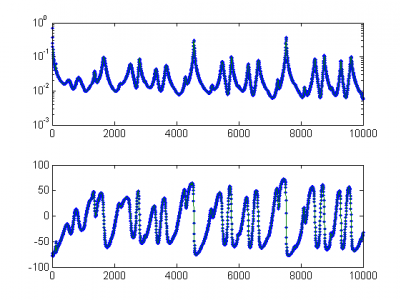Power and Energy

The DFT and FFT are used mainly to obtain the amplitude of a harmonic component from a periodic signal containing several harmonics. For instance, it is desired to know the 180 Hz harmonic amplitude from a signal. Then, the DFT and FFT are the best choices to do that.
- Categories:
 725 Views
725 ViewsIt is often the case that the frequency response data of a system or a network is available and one wants to identify a linear equivalent from the frequency response data for time-domain simulations and other purposes. To this end, a variety of methods have been proposed, and the vector fitting (VF) method and the frequency-partitioning fitting (FpF) method are often used for electromagnetic transient (EMT) simulations of power systems.
- Categories:
 805 Views
805 ViewsThis real-life current signal was acquired from a wind generator.
The nominal fundamental frequency of the system is 60 Hz.
The sampling rate is 7.680 kHz, which corresponds to 128 samples per fundamental cycle.
The magnitude is given in amperes (A). The length of the signal is approximately one hour (3640 s).
- Categories:
 20268 Views
20268 Views
This dataset includes gathering 18-month raw PV data at time intervals of about 200 µs (5 kHz sampling). A post-processing 365-day day-by-day downsampled version, converted to 10 ms intervals (100 Hz sampling), is also included. The end results are two databases: 1. The original, raw, data, including both fast (short circuit, 200 µs) and slow (sweep, 2.5-3.9 s) information for 18 months. These show intervals of missing points, but are provided to allow potential users to reproduce any new work. 2.
- Categories:
 1183 Views
1183 ViewsThis DATASET serves as a contemporary benchmark data set for solving multiple (or all) real-valued solutions for algebraic power flow problems. When this DATASET was originally created in 2019, it contained a huge collection of real-valued power flow solutions (up to dozens of thousands for some cases) for five standard IEEE test cases, i.e.
- Categories:
 4635 Views
4635 Views
This dataset lets the users to rapidally estimate electric generator size, mass and losses for given power requirement, speed and DC bus voltage.This is accomplished through the metamodeling of a normalized optimization based machine design framework. The method is applied to a permanent magnet ac machine. This work is developed using the paper Metamodeling of Rotating Electric Machinery published in IEEE Transactions on Energy Conversion.
- Categories:
 256 Views
256 ViewsThis report outlines the derivation of the first-, second-, and third-order Taylor series expansions of the power flow solution; it is the Electronic Companion of the following paper:
R. A. Jabr, “High-order approximate power flow solutions and circular arithmetic applications,” IEEE Transactions on Power Systems, vol. 34, no. 6, pp. 5053-5062, November 2019.
The derivation is carried out in complex variables via the use of Wirtinger calculus.
- Categories:
 419 Views
419 ViewsThis data is associated to an optimization model for generation expansion planning considering energy-based and power-based formulations. The data contains the information used in the case studies related to demand and renewable time series, as well as the technical characteristic of generation and storage units.
- Categories:
 899 Views
899 ViewsSeeking to improve wireless power transfer efficiency, a low-cost embedded circuit for self-tuning of impedance matching is proposed and successfully demonstrated. Applying the Maximum Power Point Tracking (MPPT) algorithm, the equivalent capacitance value on a L-match circuit is automatically changed.
- Categories:
 358 Views
358 Views





